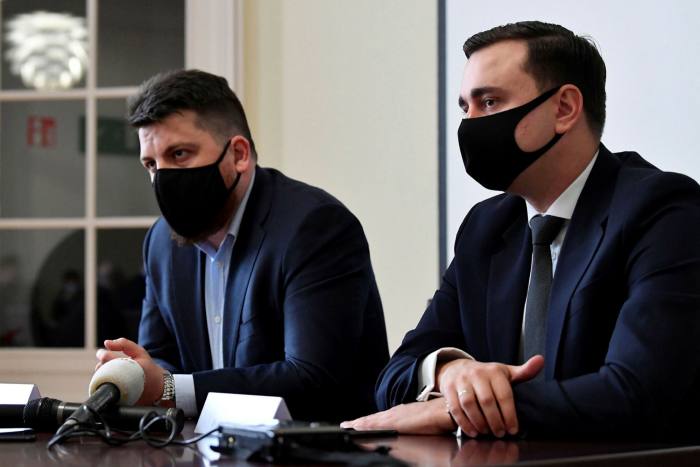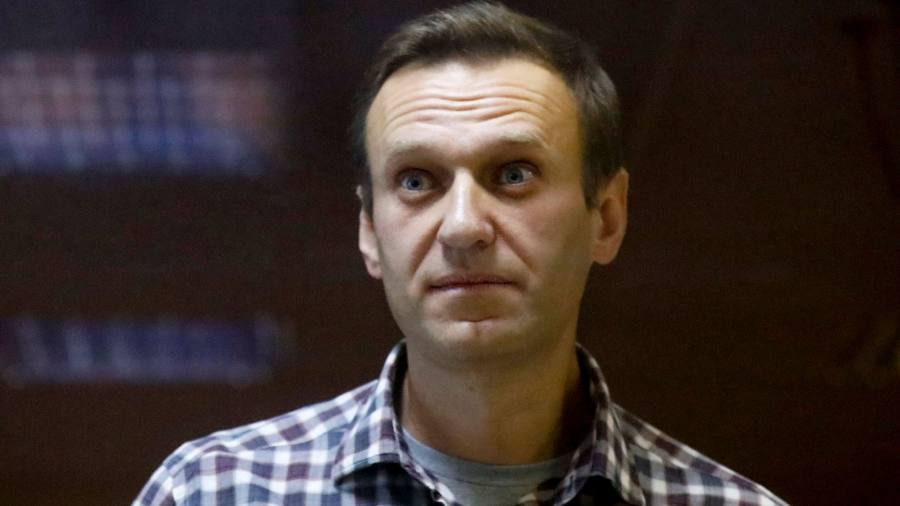[ad_1]
Supporters of jailed Russian opposition leader Alexei Navalny have called on Russians to protest against his harsh treatment in prison, saying that it could end in his imminent death.
Leonid Volkov, who runs Navalny’s foundation from exile in Vilnius, Lithuania, said in a video message on Sunday that the anti-corruption activist’s life was “hanging by a thread†19 days into a hunger strike in protest at the prison’s refusal to let him see a doctor of his choice.
“However we might want not to think about it, distance ourselves, or change the subject — it doesn’t change the fact that they’re killing Alexei Navalny. In the most terrible fashion. In front of all of us,†Volkov said.
“And the question rises before all of us, whether we want it or not: are we ready to do something to save the life of a man who’s risked his own for us for many years?â€
Yaroslav Ashikhmin, a cardiologist, posted test results on Saturday that he said showed Navalny had heightened creatine levels that could bring about kidney failure, as well as potentially fatal levels of potassium that could cause a cardiac arrest at “any momentâ€.
The sharp deterioration of Navalny’s health comes as the Kremlin appears increasingly resolved to eliminate the threat from President Vladimir Putin’s most prominent critic.
Russian prosecutors said on Friday they would move to have Navalny’s Anti-Corruption Foundation and his network of regional offices declared an “extremist organisationâ€, an unprecedented step that would essentially shut down his operations while exposing his team to potential criminal prosecution.
Navalny’s supporters described the crackdown on their group and his harsh treatment in prison as a “desperate attack†by the Kremlin in response to Putin’s declining approval ratings amid a years-long economic decline.
“If we don’t speak up now, the darkest times for free people are at hand. Russia will descend into total hopelessness. Peaceful political activity in Russia will be impossible,†Ivan Zhdanov, the head of Navalny’s foundation, said.
Navalny’s team called for the protest — which they called “the final battle between good and neutrality†— to be held on Wednesday evening on a square outside the Kremlin. Putin is set to give his annual state-of-the-nation speech to Russia’s elite just a few hours earlier.
The rally will be a big test of support for Navalny — and the Kremlin’s willingness to crack down on it — after a heavy-handed police response forced them to abandon protests over his arrest in more than 100 cities this January.
Navalny, 44, was arrested at a Moscow airport in January immediately upon returning from Germany, where he spent five months recuperating from a poisoning with the military nerve agent novichok.
He was then ordered to spend two and a half years in prison for missing parole meetings relating to a 2014 suspended sentence — including several while he was in a coma after the poisoning.
On Saturday, US president Joe Biden said Navalny’s treatment was “totally, totally unfair, totally inappropriate on the basis of having been poisoned and then on a hunger strike. Wrongâ€.
The Kremlin has denied any involvement in Navalny’s poisoning, imprisonment, and the terms of his confinement.
“He will not be allowed to die in prison, but I can say that Mr Navalny, he behaves like a hooligan, absolutely,†Andrei Kelin, Russia’s ambassador to the UK, said in an interview with the BBC on Sunday. “His purpose for all of that is to attract attention for him.â€

Last month, he was moved to a prison colony with a reputation for its harsh treatment of detainees.
He went on hunger strike in late March in protest at wardens’ refusal to let him be treated by a doctor of his choice for severe nerve pain from two herniated discs in his back, as well as sleep deprivation tactics he said amounted to “tortureâ€.
Navalny’s team is likely to face significant difficulties organising the protest after prosecutors deemed their organisation “extremistâ€.
That designation equates Navalny and his supporters with neo-Nazis, al-Qaeda and the Japanese cult Aum Shinrikyo. It means his foundation’s leadership could be jailed for up to 10 years and supporters could face as many as eight years in prison for donating to it, according to Pavel Chikov, head of Agora, a legal aid foundation.
Since Russia declared the Jehovah’s Witnesses an “extremist organisation†in 2017, 463 members of the Christian denomination have faced criminal charges, while police have searched 1,416 homes of members of the group, Chikov said.
Several of Navalny’s top allies are under house arrest on charges of violating public health rules by organising unsanctioned protests for his release in January.
Police have detained Zhdanov’s elderly father, as well as several employees at Navalny’s regional headquarters in recent weeks.
On Friday, a court also sentenced Pavel Zelensky, a cameraman for the foundation, to two years in prison for writing two tweets deemed “extremistâ€.
[ad_2]
Source link





